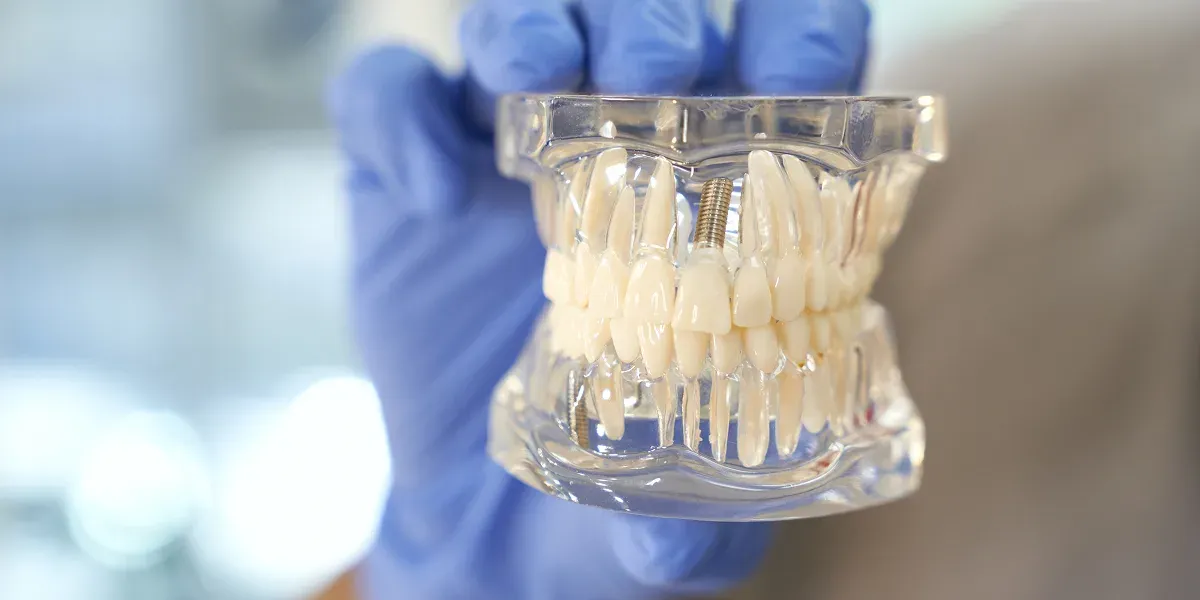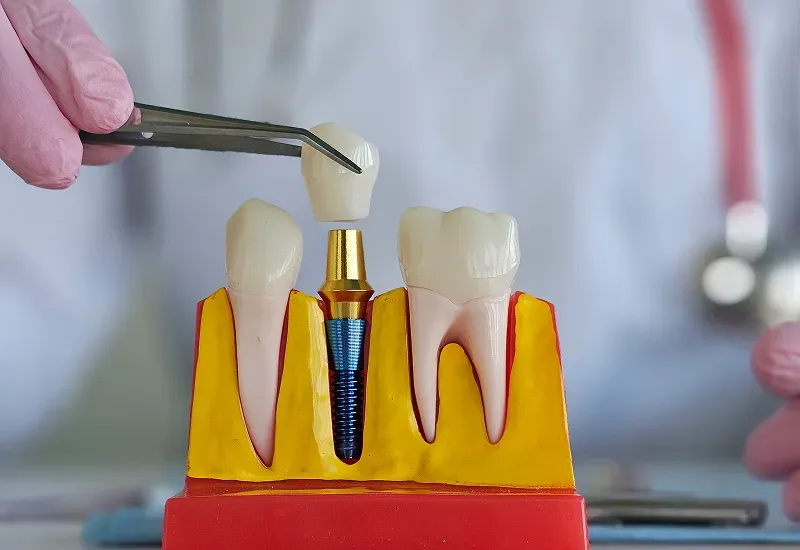Restorative dentistry
Dental Implants, Dentures, and More: Napa’s Prosthodontic Treatments Explained

by Dr. Kang
16 April 2025

Tooth loss affects people of all ages. Due to injury, decay, or aging, missing teeth can impact more than appearance. They can change how a person eats, speaks, and even how their jawbone functions over time. Prosthodontic treatments restore smiles, improve function, and help maintain long-term oral health.
Napa offers a range of prosthodontic options, including dental implants, dentures, and bridges. Each treatment serves a different purpose and depends on the condition of the patient's remaining teeth, gums, and jawbone. Choosing the right solution depends on individual needs, lifestyle, and long-term oral health goals.

What Is Prosthodontics?
Prosthodontics is a specialized area of dentistry focused on restoring and replacing missing teeth. Unlike general dentistry, which handles routine exams and cleanings, prosthodontics deals with artificial teeth and restoring oral function. Prosthodontists work with advanced dental materials and techniques to create natural-looking and durable tooth replacements.
A prosthodontic treatment plan considers multiple factors. The number of missing teeth, the condition of the jawbone, and overall oral health all play a role. Treatments range from removable options like dentures to permanent solutions like dental implants.
Dental Implants: A Permanent Tooth Replacement Option
Tooth loss affects both function and appearance. Dental implants offer a permanent way to replace missing teeth by mimicking natural tooth roots. Unlike dentures or bridges, implants integrate with the jawbone, preventing bone loss and maintaining oral health. They are often considered the best long-term solution for missing teeth because they provide stability and durability.
How Dental Implants Work
Dental implants are titanium posts surgically placed into the jawbone to replace missing tooth roots. Over time, they fuse with the bone in a process called osseointegration. This integration provides a stable foundation for a crown, bridge, or denture.
Unlike traditional dentures or bridges, dental implants do not rely on surrounding teeth for support. They act as independent tooth replacements, making them a long-term solution for missing teeth.
 Who Is a Candidate for Dental Implants?
Who Is a Candidate for Dental Implants?
Not everyone is a good candidate for dental implants. Patients must have enough bone density to support the implant. In cases where the jawbone has deteriorated, bone grafting may be required.
Good candidates for dental implants:
- Have healthy gums and no active infections
- Do not have uncontrolled diabetes or conditions that slow healing
- Do not smoke or are willing to quit before and after surgery
- Have sufficient jawbone or are willing to undergo a bone graft
Advantages of Dental Implants
- Long-lasting – With proper care, dental implants can last a lifetime.
- Prevents bone loss – Because implants stimulate the jawbone, they help prevent bone deterioration.
- Stable and secure – Unlike dentures, implants do not slip or shift when eating or speaking.
- No damage to surrounding teeth – Unlike bridges, implants do not require support from neighboring teeth.
What to Expect During the Dental Implant Procedure
- Initial Consultation – The dentist evaluates the patient's oral health and bone density using imaging technology.
- Implant Placement Surgery – A titanium post is surgically placed into the jawbone.
- Healing Period – The implant integrates with the bone over several months.
- Abutment Placement – Once healed, a small connector is attached to hold the artificial tooth.
- Crown Placement – A custom-made crown is placed on the abutment, completing the restoration.
Dentures: A Traditional Tooth Replacement Solution
Dentures are one of the most common ways to replace missing teeth. They are removable appliances that restore function and appearance. Unlike implants, dentures rest on the gums and do not require surgery. They are often chosen by patients who prefer a non-invasive solution or are not candidates for implants due to bone loss.
Types of Dentures
Dentures come in two main types:
- Full Dentures – Used when all teeth in the upper or lower jaw are missing.
- Partial Dentures – Used when some natural teeth remain. Partial dentures attach to existing teeth for support.
When Are Dentures a Good Option?
Dentures are best suited for patients who:
- Are missing multiple teeth and do not want or qualify for implants
- Have significant bone loss, making implant placement difficult
- Need a budget-friendly option for full-mouth restoration
Benefits of Dentures
- Restores chewing function – Dentures allow people to eat a wider variety of foods.
- Improves speech – Missing teeth can make certain words difficult to pronounce. Dentures help correct speech patterns.
- Cost-effective – Compared to implants, dentures are a more affordable tooth replacement option.
Challenges of Wearing Dentures
Dentures come with an adjustment period. Some patients experience:
- Difficulty eating certain foods
- The need for adhesives to keep them in place
- Changes in fit over time due to bone resorption
Bridges: A Fixed Solution for Missing Teeth
Bridges are another option for replacing missing teeth. Unlike dentures, bridges are fixed in place and do not need to be removed. They are anchored to neighboring teeth or implants and provide a functional and aesthetic replacement for missing teeth.
What Is a Dental Bridge?
A dental bridge replaces one or more missing teeth by anchoring an artificial tooth to adjacent natural teeth or implants. The supporting teeth, known as abutments, are fitted with crowns that hold the bridge in place.
Types of Dental Bridges
- Traditional Bridges – The most common type, secured by crowns on both sides of the gap.
- Cantilever Bridges – Used when only one adjacent tooth is available for support.
- Implant-Supported Bridges – Supported by dental implants instead of natural teeth.
When Are Bridges Recommended?
Bridges work best for patients who:
- Have strong and healthy teeth next to the missing tooth
- Prefer a fixed option instead of a removable denture
- Are not candidates for implants due to insufficient jawbone
Advantages of Dental Bridges
- Faster treatment compared to implants – Bridges do not require months of healing time.
- Fixed and stable – Unlike removable dentures, bridges remain in place.
- Improves chewing and speech – Bridges restore function lost due to missing teeth.
Implant-Supported Dentures: A Hybrid Option
For patients seeking a combination of affordability and stability, implant-supported dentures offer a reliable solution. These dentures attach securely to implants but can still be removed for cleaning. Unlike traditional dentures, they do not rely on adhesives and provide better support for daily activities.
How Implant-Supported Dentures Work
Implant-supported dentures combine the stability of implants with the affordability of dentures. Unlike traditional dentures, they attach securely to implants placed in the jawbone. They can be removable or permanently fixed.
Benefits of Implant-Supported Dentures
- Better stability – No slipping or shifting when eating or speaking.
- Prevents bone loss – Implants stimulate the jawbone to prevent shrinkage.
- Increased comfort – Less irritation compared to traditional dentures.
Who Should Consider Implant-Supported Dentures?
This option is ideal for patients who:
- Want better stability than traditional dentures
- Do not want to replace every missing tooth with an individual implant
- Have enough bone to support at least two to four implants
Choosing the Right Prosthodontic Treatment
There is no single best option for tooth replacement. Each patient’s needs and circumstances determine which solution is best for them. Some may benefit from the permanence of dental implants, while others may prefer the affordability of dentures or the fixed nature of bridges.
Factors to Consider
Selecting the best tooth replacement option depends on:
- The number of missing teeth
- The condition of the jawbone
- Budget and insurance coverage
- Personal preference for fixed vs. removable solutions
Which Option Is Best?
- Dental implants – Best for long-term durability and jawbone preservation.
- Dentures – Best for affordability and replacing multiple missing teeth.
- Bridges – Best for patients missing one or a few teeth with strong surrounding teeth.
- Implant-supported dentures – Best for patients seeking denture stability with fewer implants.
Conclusion
Tooth replacement is about more than just restoring a smile—it affects oral health, daily function, and overall confidence. Napa offers a range of prosthodontic solutions to suit different needs, from permanent dental implants to traditional dentures and fixed bridges.
Each treatment has benefits and limitations, and the right choice depends on individual factors like bone health, budget, and long-term goals. A consultation with a dental specialist helps determine the best solution based on each patient’s unique situation.
Contact your Dentist today, Dr Kang at Redwood Dental Napa, to learn more about Dental Implants, Dentures, and more.
Resource:
Share This:
Disclaimer
*This media/content or any other on this website does not prescribe, recommend, or prevent any treatment or procedure. Therefore, we highly recommend that you get the advice of a qualified dentist or other medical practitioners regarding your specific dental condition. *

